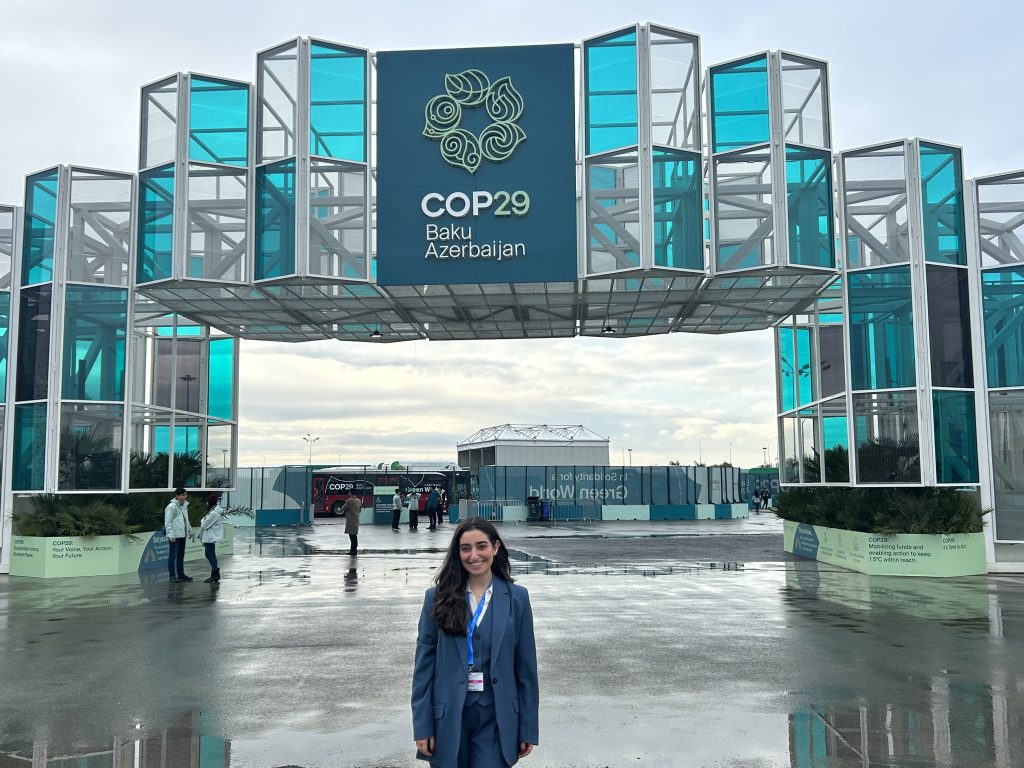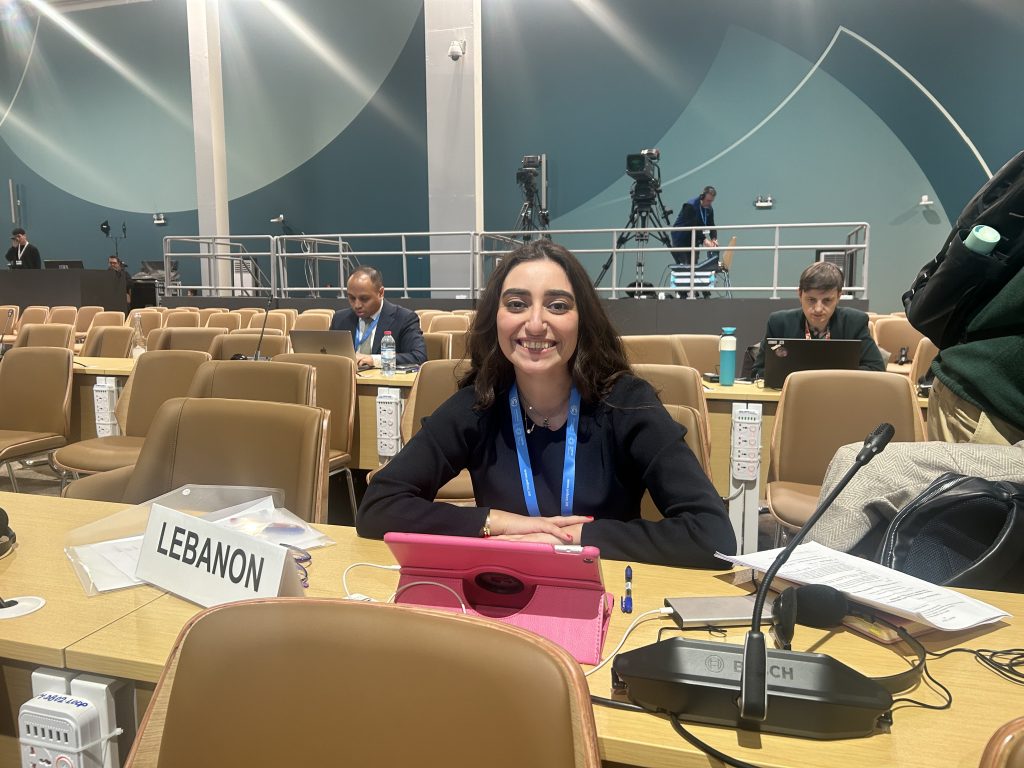Elsy Milan, a PhD student at the Centre for Environmental Policy (CEP), reflects on her experience as a young negotiator for Lebanon at COP29. She shares her journey through the intense climate negotiations, highlighting the challenges of representing Lebanon on the global stage and the growth she experienced in navigating complex policy discussions.

COP29, the most significant meeting of the year, brings together global leaders to discuss their pledges signed in both the Kyoto Protocol and the Paris Agreement. The event attracts scientists, activists, indigenous communities, civil society members and politicians. However, the main characters remain the negotiators, who, behind closed doors deliberate on a final text to include their parties’ relative aspirations on many topics. These priorities include transitioning from fossil fuels, enhancing resilience, securing the necessary funds, and fostering mitigation and adaptation under the Paris Agreement.
This year, I had the immense privilege to enter this “lion’s den” as a young negotiator for the Lebanese government on Article 6. What does it feel like to sit in a room where every word you say might shape the global climate agenda?
First impressions: A Cub’s introduction to the Lair
As PhD student at Imperial College London, it was only natural that my time prior to COP would be dedicated to meticulous preparation. When I approached my government to propose my services as a negotiator, my focus was clear: Article 6 of the Paris Agreement. In simple terms, Article 6 of the Paris Agreement is a framework of international collaboration on carbon markets to help countries meet their climate goals. This is done through direct carbon trading between countries or other non-market mechanisms such as capacity-building activities, technology sharing as well as empowering local communities. This track comes at the intersection of my academic research as I am currently focused on developing an optimisation framework through market-based policies to decarbonise end-use sectors. Leading up to COP29, I engaged with international organisations, my supervisor at Imperial, many governmental officials and regional collaborators to draft a clear position for Lebanon —our first substantial engagement with this topic. From a less technical angle, I spent countless hours developing my negotiations skills, mainly by enrolling in the Young Negotiators Program.
Yet no amount of technical expertise or diplomatic training could prepare me for the moment I stepped into Meeting Room 25, where negotiations were held daily. There, I found myself surrounded by veteran diplomats, figures who had represented their countries for over a decade. And then there I was—with my pink iPad in hand—smiling nervously at fellow delegates, too hesitant to ask questions at first.
As the days passed, however, the once-intimidating room became more familiar, and the once-unknown faces grew recognizable. Gradually, I identified the major interlocutors, wrote down their interventions, and analysed them to provide daily briefings for my delegation. Coming in with the intention to speak, I automatically learned that listening might be a more important skill. Day by day, the negotiators in suits transformed into approachable colleagues who truly had the intention to balance between their countries interests and a global consensus.
Under Pressure: it’s the Terror of Knowing What This World is About!
For many attendees, COP29 is a dynamic hub for exchange where you can attend side events, acquire additional knowledge, or network with likeminded people. However, for those holding party badges, the reality is far from this exploratory experience. Negotiations stretch from early in the mornings until late in the night. For example, hours would pass without us having a proper meal, sneaking in small snacks or a black espresso.
These gruelling two weeks culminate in an output text that must gain consensus from all parties involved. In that context, developing countries are constantly at crossroads when larger and more powerful countries pushed for terms that can marginalise smaller economies, Lebanon being one of them. An even harder truth was to discover that scientific knowledge alone is not sufficient- politics play a key role in shaping negotiations outcomes. Surprisingly, I found myself thriving in this intense atmosphere. I was thriving because I am passionate about both my work and the change, I dream about making for both my country and its future generations. Over the two weeks, I built a routine for myself, learned to draft elaborate positions and worked to transcend my country’s voice as a bridge between positions.
Daily Arab League meetings became a cornerstone of my strategy, where I brainstormed potential interventions alongside the Head of the Lebanese Delegation. My role was to provide insights and support on the intentions of different parties, reframing Lebanon’s stance and ensuring it resonated within the broader context of regional and global priorities.

Rising Above: Personal Growth Amidst Challenges
If there’s one lesson I’ve learned as a negotiator, it’s much about listening than speaking. Being a negotiator is not about pushing for a personal agenda but about finding common ground, even when differences persist, and building trust among parties who may otherwise stand worlds apart. Persistence, even in the face of scepticism, can lead to meaningful outcomes. This experience was made even more poignant by the knowledge that my home country, Lebanon, is currently in a state of war.
Negotiating on behalf of Lebanon wasn’t just about implementing a specific policy for me. It was about ensuring that the voices and struggles of my people were heard on a global stage. It was about showing that even in times of crisis, Lebanon’s commitment to a sustainable and just future remains steadfast.
Coming from a normal middle-class family, with no political ties or prior experience in public service, I never imagined myself occupying a diplomatic position at just twenty-seven years old, achieved purely on merit This is a beacon of hope for young Lebanese who dare to dream of changing their country’s future.
Leaving Baku Olympic Stadium, I glanced at the experience with more than just pride. I am grateful to serve my country, to learn from seasoned diplomats, and to grow as a person and a professional. Yet, this isn’t the end; it’s only the beginning. The real work lies ahead, and, God willing, I will once again raise Lebanon’s flag carrying forward the lessons, the challenges, and the hope that define this extraordinary experience at the heart of the Amazon at COP30.